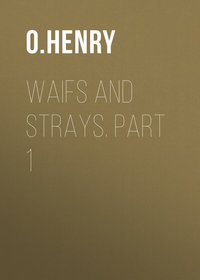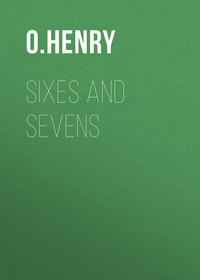 полная версия
полная версияRolling Stones
"'If you wasn't a Moses-meek little Mary's lamb, you wouldn't have been took down this way,' says he. 'Haven't you got gumption enough not to drink swamp water or fall down and scream whenever you have a little colic or feel a mosquito bite you?' He made me a little mad.
"'You've got the bedside manners of a Piute medicine man,' says I. 'And I wish you'd go away and let me die a natural death. I'm sorry I sent for you.'
"'I've a mind to,' says George, 'for nobody cares whether you live or die. But now I've been tricked into coming, I might as well stay until this little attack of indigestion or nettle rash or whatever it is, passes away.'
"Two weeks afterward, when I was beginning to get around again, the doctor laughed and said he was sure that my friend's keeping me mad all the time did more than his drugs to cure me.
"So that's the way George and me was friends. There wasn't any sentiment about it – it was just give and take, and each of us knew that the other was ready for the call at any time.
"I remember, once, I played a sort of joke on George, just to try him. I felt a little mean about it afterward, because I never ought to have doubted he'd do it.
"We was both living in a little town in the San Luis valley, running some flocks of sheep and a few cattle. We were partners, but, as usual, we didn't live together. I had an old aunt, out from the East, visiting for the summer, so I rented a little cottage. She soon had a couple of cows and some pigs and chickens to make the place look like home. George lived alone in a little cabin half a mile out of town.
"One day a calf that we had, died. That night I broke its bones, dumped it into a coarse sack and tied it up with wire. I put on an old shirt, tore a sleeve 'most out of it, and the collar half off, tangled up my hair, put some red ink on my hands and spashed some of it over my shirt and face. I must have looked like I'd been having the fight of my life. I put the sack in a wagon and drove out to George's cabin. When I halloed, he came out in a yellow dressing-gown, a Turkish cap and patent leather shoes. George always was a great dresser.
"I dumped the bundle to the ground.
"Sh-sh!' says I, kind of wild in my way. 'Take that and bury it, George, out somewhere behind your house – bury it just like it is. And don – '
"'Don't get excited,' says George. 'And for the Lord's sake go and wash your hands and face and put on a clean shirt.'
"And he lights his pipe, while I drive away at a gallop. The next morning he drops around to our cottage, where my aunt was fiddling with her flowers and truck in the front yard. He bends himself and bows and makes compliments as he could do, when so disposed, and begs a rose bush from her, saying he had turned up a little land back of his cabin, and wanted to plant something on it by way of usefulness and ornament. So my aunt, flattered, pulls up one of her biggest by the roots and gives it to him. Afterward I see it growing where he planted it, in a place where the grass had been cleared off and the dirt levelled. But neither George nor me ever spoke of it to each other again."
The moon rose higher, possibly drawing water from the sea, pixies from their dells and certainly more confidences from Simms Bell, the friend of a friend.
"There come a time, not long afterward," he went on, "when I was able to do a good turn for George Ringo. George had made a little pile of money in beeves and he was up in Denver, and he showed up when I saw him, wearing deer-skin vests, yellow shoes, clothes like the awnings in front of drug stores, and his hair dyed so blue that it looked black in the dark. He wrote me to come up there, quick – that he needed me, and to bring the best outfit of clothes I had. I had 'em on when I got the letter, so I left on the next train. George was – "
Bell stopped for half a minute, listening intently.
"I thought I heard a team coming down the road," he explained. "George was at a summer resort on a lake near Denver and was putting on as many airs as he knew how. He had rented a little two-room cottage, and had a Chihauhau dog and a hammock and eight different kinds of walking sticks.
"'Simms,' he says to me, 'there's a widow woman here that's pestering the soul out of me with her intentions. I can't get out of her way. It ain't that she ain't handsome and agreeable, in a sort of style, but her attentions is serious, and I ain't ready for to marry nobody and settle down. I can't go to no festivity nor sit on the hotel piazza or mix in any of the society round-ups, but what she cuts me out of the herd and puts her daily brand on me. I like this here place,' goes on George, 'and I'm making a hit here in the most censorious circles, so I don't want to have to run away from it. So I sent for you.'
"'What do you want me to do?' I asks George.
"'Why,' says he, 'I want you to head her off. I want you to cut me out. I want you to come to the rescue. Suppose you seen a wildcat about for to eat me, what would you do?'
"'Go for it,' says I.
"'Correct,' says George. 'Then go for this Mrs. De Clinton the same.'
"'How am I to do it?' I asks. 'By force and awfulness or in some gentler and less lurid manner?'
"'Court her,' George says, 'get her off my trail. Feed her. Take her out in boats. Hang around her and stick to her. Get her mashed on you if you can. Some women are pretty big fools. Who knows but what she might take a fancy to you.'
"'Had you ever thought,' I asks, 'of repressing your fatal fascinations in her presence; of squeezing a harsh note in the melody of your siren voice, of veiling your beauty – in other words, of giving her the bounce yourself?'
"George sees no essence of sarcasm in my remark. He twists his moustache and looks at the points of his shoes.
"'Well, Simms,' he said, 'you know how I am about the ladies. I can't hurt none of their feelings. I'm, by nature, polite and esteemful of their intents and purposes. This Mrs. De Clinton don't appear to be the suitable sort for me. Besides, I ain't a marrying man by all means.'
"'All right,' said I, 'I'll do the best I can in the case.'
"So I bought a new outfit of clothes and a book on etiquette and made a dead set for Mrs. De Clinton. She was a fine-looking woman, cheerful and gay. At first, I almost had to hobble her to keep her from loping around at George's heels; but finally I got her so she seemed glad to go riding with me and sailing on the lake; and she seemed real hurt on the mornings when I forgot to send her a bunch of flowers. Still, I didn't like the way she looked at George, sometimes, out of the corner of her eye. George was having a fine time now, going with the whole bunch just as he pleased. Yes'm," continued Bell, "she certainly was a fine-looking woman at that time. She's changed some since, as you might have noticed at the supper table."
"What!" I exclaimed.
"I married Mrs. De Clinton," went on Bell. "One evening while we were up at the lake. When I told George about it, he opened his mouth and I thought he was going to break our traditions and say something grateful, but he swallowed it back.
"'All right,' says he, playing with his dog. 'I hope you won't have too much trouble. Myself, I'm not never going to marry.'
"That was three years ago," said Bell. "We came here to live. For a year we got along medium fine. And then everything changed. For two years I've been having something that rhymes first-class with my name. You heard the row upstairs this evening? That was a merry welcome compared to the usual average. She's tired of me and of this little town life and she rages all day, like a panther in a cage. I stood it until two weeks ago and then I had to send out The Call. I located George in Sacramento. He started the day he got my wire."
Mrs. Bell came out of the house swiftly toward us. Some strong excitement or anxiety seemed to possess her, but she smiled a faint hostess smile, and tried to keep her voice calm.
"The dew is falling," she said, "and it's growing rather late. Wouldn't you gentlemen rather come into the house?"
Bell took some cigars from his pocket and answered: "It's most too fine a night to turn in yet. I think Mr. Ames and I will walk out along the road a mile or so and have another smoke. I want to talk with him about some goods that I want to buy."
"Up the road or down the road?" asked Mrs. Bell.
"Down," said Bell.
I thought she breathed a sigh of relief.
When we had gone a hundred yards and the house became concealed by trees, Bell guided me into the thick grove that lined the road and back through them toward the house again. We stopped within twenty yards of the house, concealed by the dark shadows. I wondered at this maneuver. And then I heard in the distance coming down the road beyond the house, the regular hoofbeats of a team of horses. Bell held his watch in a ray of moonlight.
"On time, within a minute," he said. "That's George's way."
The team slowed up as it drew near the house and stopped in a patch of black shadows. We saw the figure of a woman carrying a heavy valise move swiftly from the other side of the house, and hurry to the waiting vehicle. Then it rolled away briskly in the direction from which it had come.
I looked at Bell inquiringly, I suppose. I certainly asked him no question.
"She's running away with George," said Bell, simply. "He's kept me posted about the progress of the scheme all along. She'll get a divorce in six months and then George will marry her. He never helps anybody halfway. It's all arranged between them."
I began to wonder what friendship was, after all.
When we went into the house, Bell began to talk easily on other subjects; and I took his cue. By and by the big chance to buy out the business in Mountain City came back to my mind and I began to urge it upon him. Now that he was free, it would be easier for him to make the move; and he was sure of a splendid bargain.
Bell was silent for some minutes, but when I looked at him I fancied that he was thinking of something else – that he was not considering the project.
"Why, no, Mr. Ames," he said, after a while, "I can't make that deal. I'm awful thankful to you, though, for telling me about it. But I've got to stay here. I can't go to Mountain City."
"Why?" I asked.
"Missis Bell," he replied, "won't live in Mountain City, She hates the place and wouldn't go there. I've got to keep right on here in Saltillo."
"Mrs. Bell!" I exclaimed, too puzzled to conjecture what he meant.
"I ought to explain," said Bell. "I know George and I know Mrs. Bell. He's impatient in his ways. He can't stand things that fret him, long, like I can. Six months, I give them – six months of married life, and there'll be another disunion. Mrs. Bell will come back to me. There's no other place for her to go. I've got to stay here and wait. At the end of six months, I'll have to grab a satchel and catch the first train. For George will be sending out The Call."
A DINNER AT –3
[The story referred to in this skit appears in "The Trimmed Lamp" under the same title – "The Badge of Policeman O'Roon."]
The Adventures of an Author With His Own Hero
All that day – in fact from the moment of his creation – Van Sweller had conducted himself fairly well in my eyes. Of course I had had to make many concessions; but in return he had been no less considerate. Once or twice we had had sharp, brief contentions over certain points of behavior; but, prevailingly, give and take had been our rule.
His morning toilet provoked our first tilt. Van Sweller went about it confidently.
"The usual thing, I suppose, old chap," he said, with a smile and a yawn. "I ring for a b. and s., and then I have my tub. I splash a good deal in the water, of course. You are aware that there are two ways in which I can receive Tommy Carmichael when he looks in to have a chat about polo. I can talk to him through the bathroom door, or I can be picking at a grilled bone which my man has brought in. Which would you prefer?"
I smiled with diabolic satisfaction at his coming discomfiture.
"Neither," I said. "You will make your appearance on the scene when a gentleman should – after you are fully dressed, which indubitably private function shall take place behind closed doors. And I will feel indebted to you if, after you do appear, your deportment and manners are such that it will not be necessary to inform the public, in order to appease its apprehension, that you have taken a bath."
Van Sweller slightly elevated his brows.
"Oh, very well," he said, a trifle piqued. "I rather imagine it concerns you more than it does me. Cut the 'tub' by all means, if you think best. But it has been the usual thing, you know."
This was my victory; but after Van Sweller emerged from his apartments in the "Beaujolie" I was vanquished in a dozen small but well-contested skirmishes. I allowed him a cigar; but routed him on the question of naming its brand. But he worsted me when I objected to giving him a "coat unmistakably English in its cut." I allowed him to "stroll down Broadway," and even permitted "passers by" (God knows there's nowhere to pass but by) to "turn their heads and gaze with evident admiration at his erect figure." I demeaned myself, and, as a barber, gave him a "smooth, dark face with its keen, frank eye, and firm jaw."
Later on he looked in at the club and saw Freddy Vavasour, polo team captain, dawdling over grilled bone No. 1.
"Dear old boy," began Van Sweller; but in an instant I had seized him by the collar and dragged him aside with the scantiest courtesy.
"For heaven's sake talk like a man," I said, sternly. "Do you think it is manly to use those mushy and inane forms of address? That man is neither dear nor old nor a boy."
To my surprise Van Sweller turned upon me a look of frank pleasure.
"I am glad to hear you say that," he said, heartily. "I used those words because I have been forced to say them so often. They really are contemptible. Thanks for correcting me, dear old boy."
Still I must admit that Van Sweller's conduct in the park that morning was almost without flaw. The courage, the dash, the modesty, the skill, and fidelity that he displayed atoned for everything.
This is the way the story runs. Van Sweller has been a gentleman member of the "Rugged Riders," the company that made a war with a foreign country famous. Among his comrades was Lawrence O'Roon, a man whom Van Sweller liked. A strange thing – and a hazardous one in fiction – was that Van Sweller and O'Roon resembled each other mightily in face, form, and general appearance. After the war Van Sweller pulled wires, and O'Roon was made a mounted policeman.
Now, one night in New York there are commemorations and libations by old comrades, and in the morning, Mounted Policeman O'Roon, unused to potent liquids – another premise hazardous in fiction – finds the earth bucking and bounding like a bronco, with no stirrup into which he may insert foot and save his honor and his badge.
Noblesse oblige? Surely. So out along the driveways and bridle paths trots Hudson Van Sweller in the uniform of his incapacitated comrade, as like unto him as one French pea is unto a petit pois.
It is, of course, jolly larks for Van Sweller, who has wealth and social position enough for him to masquerade safely even as a police commissioner doing his duty, if he wished to do so. But society, not given to scanning the countenances of mounted policemen, sees nothing unusual in the officer on the beat.
And then comes the runaway.
That is a fine scene – the swaying victoria, the impetuous, daft horses plunging through the line of scattering vehicles, the driver stupidly holding his broken reins, and the ivory-white face of Amy Ffolliott, as she clings desperately with each slender hand. Fear has come and gone: it has left her expression pensive and just a little pleading, for life is not so bitter.
And then the clatter and swoop of Mounted Policeman Van Sweller! Oh, it was – but the story has not yet been printed. When it is you shall learn bow he sent his bay like a bullet after the imperilled victoria. A Crichton, a Crœsus, and a Centaur in one, he hurls the invincible combination into the chase.
When the story is printed you will admire the breathless scene where Van Sweller checks the headlong team. And then he looks into Amy Ffolliott's eyes and sees two things – the possibilities of a happiness he has long sought, and a nascent promise of it. He is unknown to her; but he stands in her sight illuminated by the hero's potent glory, she his and he hers by all the golden, fond, unreasonable laws of love and light literature.
Ay, that is a rich moment. And it will stir you to find Van Sweller in that fruitful nick of time thinking of his comrade O'Roon, who is cursing his gyrating bed and incapable legs in an unsteady room in a West Side hotel while Van Sweller holds his badge and his honor.
Van Sweller hears Miss Ffolliott's voice thrillingly asking the name of her preserver. If Hudson Van Sweller, in policeman's uniform, has saved the life of palpitating beauty in the park – where is Mounted Policeman O'Roon, in whose territory the deed is done? How quickly by a word can the hero reveal himself, thus discarding his masquerade of ineligibility and doubling the romance! But there is his friend!
Van Sweller touches his cap. "It's nothing, Miss," he says, sturdily; "that's what we are paid for – to do our duty." And away he rides. But the story does not end there.
As I have said, Van Sweller carried off the park scene to my decided satisfaction. Even to me he was a hero when he foreswore, for the sake of his friend, the romantic promise of his adventure. It was later in the day, amongst the more exacting conventions that encompass the society hero, when we had our liveliest disagreement. At noon he went to O'Roon's room and found him far enough recovered to return to his post, which he at once did.
At about six o'clock in the afternoon Van Sweller fingered his watch, and flashed at me a brief look full of such shrewd cunning that I suspected him at once.
"Time to dress for dinner, old man," he said, with exaggerated carelessness.
"Very well," I answered, without giving him a clew to my suspicions; "I will go with you to your rooms and see that you do the thing properly. I suppose that every author must be a valet to his own hero."
He affected cheerful acceptance of my somewhat officious proposal to accompany him. I could see that he was annoyed by it, and that fact fastened deeper in my mind the conviction that he was meditating some act of treachery.
When he had reached his apartments he said to me, with a too patronizing air: "There are, as you perhaps know, quite a number of little distinguishing touches to be had out of the dressing process. Some writers rely almost wholly upon them. I suppose that I am to ring for my man, and that he is to enter noiselessly, with an expressionless countenance."
"He may enter," I said, with decision, "and only enter. Valets do not usually enter a room shouting college songs or with St. Vitus's dance in their faces; so the contrary may be assumed without fatuous or gratuitous asseveration."
"I must ask you to pardon me," continued Van Sweller, gracefully, "for annoying you with questions, but some of your methods are a little new to me. Shall I don a full-dress suit with an immaculate white tie – or is there another tradition to be upset?"
"You will wear," I replied, "evening dress, such as a gentleman wears. If it is full, your tailor should be responsible for its bagginess. And I will leave it to whatever erudition you are supposed to possess whether a white tie is rendered any whiter by being immaculate. And I will leave it to the consciences of you and your man whether a tie that is not white, and therefore not immaculate, could possibly form any part of a gentleman's evening dress. If not, then the perfect tie is included and understood in the term 'dress,' and its expressed addition predicates either a redundancy of speech or the spectacle of a man wearing two ties at once."
With this mild but deserved rebuke I left Van Sweller in his dressing-room, and waited for him in his library.
About an hour later his valet came out, and I heard him telephone for an electric cab. Then out came Van Sweller, smiling, but with that sly, secretive design in his eye that was puzzling me.
"I believe," he said easily, as he smoothed a glove, "that I will drop in at –4 for dinner."
I sprang up, angrily, at his words. This, then, was the paltry trick he had been scheming to play upon me. I faced him with a look so grim that even his patrician poise was flustered.
"You will never do so," I exclaimed, "with my permission. What kind of a return is this," I continued, hotly, "for the favors I have granted you? I gave you a 'Van' to your name when I might have called you 'Perkins' or 'Simpson.' I have humbled myself so far as to brag of your polo ponies, your automobiles, and the iron muscles that you acquired when you were stroke-oar of your 'varsity eight,' or 'eleven,' whichever it is. I created you for the hero of this story; and I will not submit to having you queer it. I have tried to make you a typical young New York gentleman of the highest social station and breeding. You have no reason to complain of my treatment to you. Amy Ffolliott, the girl you are to win, is a prize for any man to be thankful for, and cannot be equalled for beauty – provided the story is illustrated by the right artist. I do not understand why you should try to spoil everything. I had thought you were a gentleman."
"What it is you are objecting to, old man?" asked Van Sweller, in a surprised tone.
"To your dining at –5," I answered. "The pleasure would be yours, no doubt, but the responsibility would fall upon me. You intend deliberately to make me out a tout for a restaurant. Where you dine to-night has not the slightest connection with the thread of our story. You know very well that the plot requires that you be in front of the Alhambra Opera House at 11:30 where you are to rescue Miss Ffolliott a second time as the fire engine crashes into her cab. Until that time your movements are immaterial to the reader. Why can't you dine out of sight somewhere, as many a hero does, instead of insisting upon an inapposite and vulgar exhibition of yourself?"
"My dear fellow," said Van Sweller, politely, but with a stubborn tightening of his lips, "I'm sorry it doesn't please you, but there's no help for it. Even a character in a story has rights that an author cannot ignore. The hero of a story of New York social life must dine at –6 at least once during its action."
"'Must,'" I echoed, disdainfully; "why 'must'? Who demands it?"
"The magazine editors," answered Van Sweller, giving me a glance of significant warning.
"But why?" I persisted.
"To please subscribers around Kankakee, Ill.," said Van Sweller, without hesitation.
"How do you know these things?" I inquired, with sudden suspicion. "You never came into existence until this morning. You are only a character in fiction, anyway. I, myself, created you. How is it possible for you to know anything?"
"Pardon me for referring to it," said Van Sweller, with a sympathetic smile, "but I have been the hero of hundreds of stories of this kind."
I felt a slow flush creeping into my face.
"I thought…" I stammered; "I was hoping… that is… Oh, well, of course an absolutely original conception in fiction is impossible in these days."
"Metropolitan types," continued Van Sweller, kindly, "do not offer a hold for much originality. I've sauntered through every story in pretty much the same way. Now and then the women writers have made me cut some rather strange capers, for a gentleman; but the men generally pass me along from one to another without much change. But never yet, in any story, have I failed to dine at –7."
"You will fail this time," I said, emphatically.
"Perhaps so," admitted Van Sweller, looking out of the window into the street below, "but if so it will be for the first time. The authors all send me there. I fancy that many of them would have liked to accompany me, but for the little matter of the expense."
"I say I will be touting for no restaurant," I repeated, loudly. "You are subject to my will, and I declare that you shall not appear of record this evening until the time arrives for you to rescue Miss Ffolliott again. If the reading public cannot conceive that you have dined during that interval at some one of the thousands of establishments provided for that purpose that do not receive literary advertisement it may suppose, for aught I care, that you have gone fasting."








![Heart of the West [Annotated]](/covers_200/25561004.jpg)
